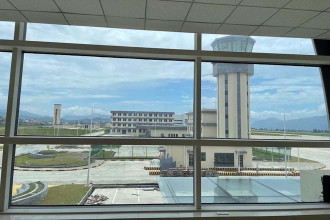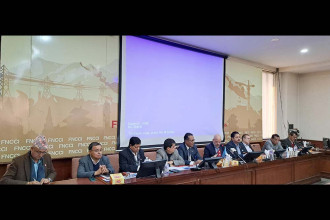KATHMANDU: A national seminar on the interconnection between education and employment, jointly organised by the Confederation of Nepalese Industries (CNI), Hotel Association Nepal (HAN), and NADA Automobiles Association of Nepal, was successfully concluded on Thursday.
Supported by the Enhanced Skills for Sustainable and Rewarding Employment (ENSSURE) project, a bilateral agreement between the Government of Nepal and the Swiss Government, the seminar aimed to strengthen the relationship between education and employment, provide employment-oriented skills to Nepali youth, and make them employable.
The seminar was organised with the objectives of addressing the existing challenges for the private sector's involvement in Technical and Vocational Education and Training (TVET) in Nepal, providing policy recommendations to increase private sector participation, and improving the social perspective on TVET.
Inaugurating the programme, Minister for Education, Science and Technology, Bidya Bhattarai, stated that policies should be formulated to link education, business and labour. She pointed out that the CTEVT, established in 2045 BS, was still operating under the same policy as in 2045 BS, even after reaching 2081 BS. She emphasised the need to at least improve the curriculum and restructure the CTEVT.
The keynote speaker, Professor Dr Ursula Reynolds, Chair of the Education System at ETH Zurich, emphasised the need for industrial sector involvement in the TVET sector in a federal structure. She stressed that the education system should ensure the production of manpower required by the industry.
Birendra Raj Pandey, Vice President of CNI, stated that there is a huge shortage of skills in the country. He said that industries were struggling to find skilled manpower and emphasised the need to reduce the mismatch between education and employment systems to develop skilled manpower. He stated that the Apprenticeship Training (AT) programme is important for developing the skilled manpower required for industries.
Matthias Meier, Deputy Head of Mission/Charge d'Affaires at the Swiss Embassy, stated that Switzerland has been promoting the Dual-VET industrial apprenticeship training programme in Nepal for over a year.
Similarly, Mahesh Bhattarai, Member-Secretary of CTEVT; Binayak Shah, President of Hotel Association Nepal; and Karan Chaudhary, President of NADA Automobiles Association of Nepal; emphasised the need to connect Nepali youth with education and employment to create skilled manpower.
The seminar included two technical sessions. The first session discussed the role of the private sector in TVET programmes, policy barriers, and the search for potential solutions. The session presented papers on Dual-VET industrial apprenticeship training in Nepal, the results of a study on the benefits of industrial training for youth and industries, and policy gaps in CTEVT. There was a discussion on these issues among representatives from the Parliamentary Education Committee, Ministry of Education, CNI, and the Federation of Nepalese Chambers of Commerce and Industry.
The second session discussed the role of the private sector during the training period of TVET programmes, along with existing practices and the need for improvement. Two papers were presented on the status of TVET schools in Nepal and how sectoral skills committees led by industries can reduce the gap between the needs of employers and production.
Following the presentation, there was a panel discussion involving representatives from sectoral skills committees, CTEVT, and the Ministry of Labour, Employment and Social Security.
The programme also included a skills competition among trainees of the Hotel Management and Automobile Industrial Pre-Diploma programme. The participating trainees demonstrated vehicle repair and cooking skills.
Panchakanya Group, Nepal Ekarat Engineering Company, Arihant Multi Fibers, CG Moto Corporation, and Airport Hotel were awarded the Apprenticeship Champion Award. The industries were awarded in recognition of their active participation in the programme by providing training opportunities to a large number of trainees in their industries, giving priority to disadvantaged youth and women involved in the industrial apprenticeship training programme.
Additionally, the skill competition winners Basant Kumar Chaudhary, Rabina Rai and Rashmi Mukhiya were awarded.
In essence, the seminar highlighted the critical need to bridge the gap between education and employment in Nepal, emphasising the role of the private sector, policy reforms, and skill development.






